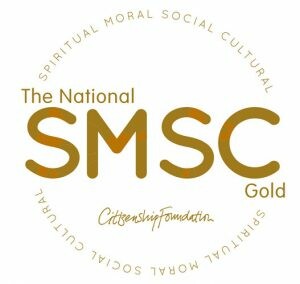Social, Moral, Spiritual, Cultural (SMSC)

At Admiral Lord Nelson School, our motto ‘Dare to Dream, Aim to Achieve’ exemplifies our attitude and approach to the importance of the development of all aspects of SMSC. We champion and firmly believe in a broad and balanced education, experiences and a curriculum that ensures that our students are ‘respectful global citizens’.

We recognise that the development of students, spiritually, morally, socially and culturally plays a significant part not only in their ability to learn and achieve but in their ability to relate fully to and have the ability to access the world they live in. We therefore aim to provide an education that provides children with opportunities to explore and develop their own values, whilst recognising that those of others may differ. Beliefs, spiritual awareness, high standards of personal behaviour including a positive caring attitude towards other people, an understanding of their social and cultural traditions and an appreciation of the diversity and richness of other cultures are all critical skills and dispositions that we nurture, encourage and develop through our whole curriculum and beyond.
All curriculum areas have a contribution to a child’s spiritual, moral, social and cultural development and opportunities for this will be planned in each area of the curriculum. Belief values, principles and spirituality will be explored across the curriculum. The integrity and spirituality of faith backgrounds will be respected and explored. The diversity of spiritual traditions will be recognised, and pupils will be given access to alternative views.
All adults model and promote socially responsible behaviour, treating all people as valuable individuals and showing respect for pupils and their families and stakeholders. Students should learn to differentiate between right and wrong in as far as their actions affect other people. They are encouraged to value themselves and others.
Students should understand their rights and accept their responsibilities and the need to respect the rights of others. As a ‘Right respecting School’ this firmly underpins everything we do. We have our RRSA charter that promotes responsible and respectful behaviour.
Our aims
We aim to ensure:
- That everyone connected with the school in anyway is aware of our values and principles and our commitment to being an RRSA school.
- A consistent approach to the delivery of SMSC issues through the curriculum and the wider life of the school.
- That a child’s education is set within the context that is meaningful and appropriate to their age, aptitude and background.
- That children have a good understanding of their right and their responsibilities.
- That we promote the fundamental British values of democracy, the rule of law, individual liberty, and mutual respect and tolerance of those with different faiths and beliefs.
Through the experiences we provide we will give the children opportunities to:
- Share their achievements and successes with other
- Talk about personal experiences and feelings
- Express and clarify their own ideas and beliefs
- Speak about difficult events, e.g. bullying, death etc
- Explore relationships with friends/family/others
- Consider the needs and behaviour of others
- Show empathy
- Develop self-esteem and a respect for others
- Develop a sense of belonging
- Develop the skills and attitudes that enable children to develop socially, morally, spiritually and culturally e.g. empathy, respect, open-mindedness, sensitivity, critical awareness etc.
Through our curriculum we provide opportunities to:
- Listen and talk to each other
- Learn an awareness of treating all as equals, accepting people who are different because of physical and learning difficulties
- Agree and disagree
- Experience good role models
- Work co-operatively and collaboratively
- Work creatively and with imagination
Spiritual Development
- Sustain their self-esteem in their learning experience
- Develop their capacity for critical and independent thought
- Foster their emotional life and express their feelings
- Experience moments of stillness and reflection
- Discuss their beliefs, feelings, values and responses to personal experiences
- Form and maintain worthwhile and satisfying relationships
- Reflect on, consider and celebrate the wonders and mysteries of life
Moral Development
- Recognise the unique value of each individual
- Listen and respond appropriately to the views of other
- Gain the confidence to cope with setbacks and learn from mistakes
- Take initiative and act responsibly with consideration for others
- Distinguish between right and wrong
- Show respect for the environment
- Make informed and independent judgements
- Take action for justice
Social Development
- Develop an understanding of their individual and group identity
- Helping others in the school and wider community
Cultural Development
- Recognise the value and richness of cultural diversity in Modern Britain
- Develop an understanding of Modern Britain’s local, national, European, Commonwealth and global dimensions.
Practical activities to develop SMSC include:
- Involvement in Student Voice: School Council, prefects, Subject Ambassadors
- Working together in different groupings and situations
- Taking responsibility
- Encouraging teamwork
- Showing appreciation of the performances of other children regardless of ability
- Hearing music from different composers, cultures and genres
- Meeting people from different cultures and countries
- Participation in a variety of different educational visits
- Participation in live performances
- Use of assembly themes to explore important aspects of our heritage and other cultures
- Studying literature and art from different cultures supported by visits from writers and artists and participating in workshops
- Opportunities for the students to hear and see live performances by professional actors, dancers and musicians
- Opportunities to make and evaluate food from other countries
Links with the wider community
- The school will support the work of a variety of charities who are both local and international.
- The development of a strong home-school agreement is regarded as very important, enabling parents and teachers to work in an effective partnership to support the children
- Children will be taught to appreciate and take responsibility for their local environment
- Liaison with other schools to support the curriculum e.g. PE, Performance, Art
